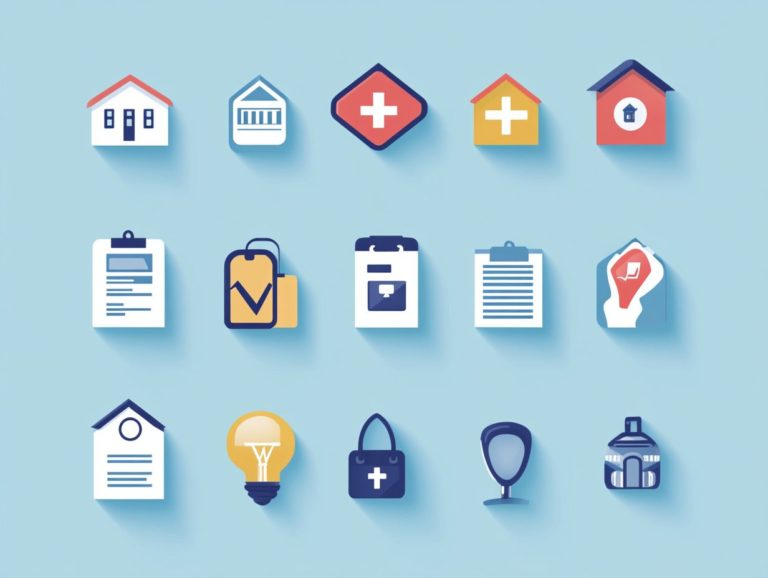How to Manage Financial Risks in Freelancing
Freelancing offers remarkable freedom and flexibility. However, it also comes with unique financial risks. Understanding these risks is vital. It helps you thrive in an independent work environment.
This article dives into the financial challenges freelancers face, including income volatility and unexpected expenses. You will find guidance on assessing and minimizing these risks, developing a solid financial plan, and ensuring you have the appropriate insurance that protects you from legal claims coverage.
It also discusses strategies to build a financial safety net and prepare for unforeseen circumstances. Whether you are an experienced Freelancer or just starting out, this article equips you with the knowledge needed to navigate the financial aspects of freelancing successfully.
Contents
Key Takeaways:
- Understand the types of financial risks in freelancing, such as late payments and project cancellations.
- Identify potential issues and implement strategies, like diversifying income streams.
- Create a financial plan, including budgeting, setting goals, and considering insurance options for protection.

Understanding Financial Risks in Freelancing
Recognizing financial risks in freelancing is crucial for achieving long-term financial stability and effective personal finance management. Freelancers face unique challenges. Fluctuating income and lack of employer benefits mean they must identify various financial risks that can impact their ability to manage debt and maintain a sustainable budget.
These risks include insufficient emergency funds, unexpected expenses, and liabilities from inadequate insurance that protects you from legal claims. By acknowledging and addressing these challenges, freelancers can develop a holistic and comprehensive financial plan incorporating effective risk management strategies.
Understanding the Financial Risks You Face
Freelancers encounter various financial risks that can adversely affect their overall financial well-being. These risks include fixed expenses, variable expenses, student loans, and the potential for bankruptcy.
Fixed expenses are costs that remain constant regardless of a freelancer’s income level, such as rent, utilities, and insurance. Many freelancers opt for higher fixed expenses to accelerate their business growth. However, this strategy can backfire if freelance income decreases, forcing them to dip into savings or incur debt to meet non-negotiable obligations.
Variable expenses, on the other hand, encompass costs like marketing and professional development that freelancers incur to expand their businesses. If not carefully managed, these variable expenses can become fixed costs. Their irregular nature makes them hard to predict, contributing to financial uncertainty.
One of the most common forms of financial uncertainty for freelancers is income variability. They often experience unpredictable freelance income streams, with months of high earnings followed by leaner months. This unpredictability complicates forecasts for both gross and net cash flow. Coupled with high fixed costs such as rent and utilities, this situation can create financial pressures that may lead to bankruptcy.
Student loans represent another source of increasing liabilities for freelancers. The growing reliance on credit cards for both personal and professional expenses is also a significant concern. Uncontrolled credit card use can lead to overwhelming debt and crippling interest rates, while rising liabilities from educational loans further exacerbate these challenges. Poor repayment plan strategies for both credit and student loans increase the debt burden, posing a critical issue within the expanding freelance and gig economy.
To mitigate these financial risks, freelancers must adopt effective budgeting practices and maintain control over their spending. Doing so will help them build a more stable and sustainable career.
Assessing and Mitigating Risks
Evaluating and reducing financial risks is essential for freelancers seeking to ensure financial stability and effectively manage debt. This process involves income tracking and budget creation.
Identifying Potential Risks
The first step for freelancers in effective financial planning and establishing a strong emergency fund to secure their long-term financial health is to identify potential financial risks.
To successfully navigate the unpredictable nature of freelance work, freelancers need to analyze their income variability. By tracking their income over time, they can discern patterns that reveal periods of feast and famine.
Unexpected expenses, such as equipment breakdowns and unforeseen tax obligations, necessitate flexible budgets.
Relying on a few clients can create financial risk. Maintaining a diverse client base helps protect freelancers from sudden income drops.
By recognizing these risks in advance and preparing for them, freelancers can develop more effective budgeting apps.
Strategies for Risk Management
Freelancers should implement effective ways to pay off debt, such as the snowball strategy and avalanche strategy. These strategies are not one-size-fits-all; evaluating personal financial situations will help freelancers select the method that aligns best with their goals and psychological needs.
The snowball method, which prioritizes paying off smaller debts first, provides a sense of achievement that can boost motivation. In contrast, the avalanche method focuses on paying off high-interest debts first, ultimately saving borrowers more money over time.
Along with choosing a debt repayment strategy, freelancers should establish a robust emergency fund to create a financial buffer against unexpected expenses that could disrupt their repayment plans.
A solid budget is essential. It allows freelancers to monitor their income and expenses, ensuring they meet their financial goals while minimizing potential risks.
Creating a Financial Plan for Freelancing
Creating a solid financial plan is crucial for your success as a freelancer! It ensures financial stability, helps manage debt effectively, and enables accurate assessment of income.
Budgeting and Setting Financial Goals
Effective financial planning for freelancers relies on budgeting and setting financial goals. These are essential for managing both fixed expenses and variable expenses.
By categorizing fixed expenses, such as rent and utilities, alongside variable expenses like groceries and entertainment, freelancers can gain a clearer understanding of their finances.
This approach fosters better spending habits and helps set achievable financial goals. It allows funds to be directed toward savings, investments, and emergency funds.
Many freelancers utilize budgeting apps to simplify this process. These apps help track spending, provide an overview of spending patterns, and streamline budgeting overall.
With just a few clicks, freelancers can monitor their progress and ensure they remain on track to achieve their financial objectives while also considering debt consolidation.
Insurance Options for Freelancers
Freelancers should carefully evaluate their insurance options. Obtaining the right coverage—such as liability insurance and health insurance—can reduce their financial risk and improve their overall risk management strategy.
Types of Insurance Coverage
The most common types of insurance coverage for freelancers include liability insurance and health insurance. These offer protection against various financial risks.
Professional indemnity insurance is particularly beneficial for freelancers. This type of insurance protects you from claims of negligence or mistakes made while providing professional services, making it a vital component of their business safety net.
Additionally, income protection insurance is essential for freelancers. It provides a source of income during periods when they are unable to work due to illness or injury.
Without these coverages, freelancers face a higher risk of unexpected costs and potential legal claims, which could jeopardize their financial livelihood.
Start evaluating your insurance options today to safeguard your freelance career!
Choosing the Right Insurance for Your Needs
Choosing the right insurance can feel overwhelming, but it’s essential for freelancers! When selecting insurance to manage risk, freelancers must consider several key factors, including their level of personal risk, the unique challenges associated with their specific career path, and their financial resources for coverage. These three elements include the main factors freelancers should evaluate when choosing a policy, ensuring effective debt management.
-
First, freelancers should thoroughly understand and assess the specific risks they face. This includes both broad categories of risk and personal situational factors. For instance, they should consider the liability involved in their particular work, potential medical expenses, and the likelihood of income disruption.
-
The second important factor is budget. Generally, the more risks that are covered, the higher the insurance premium will be. However, there comes a point where additional coverage may provide little added benefit, making the extra cost unjustifiable. Striking a balance between the level of risk and budget is crucial to avoid being either underinsured or overinsured.
-
Freelancers should compare different policies directly. This involves evaluating available plans for liability insurance, health insurance tailored for freelancers, and various types of insurance that protects income for those who work for themselves.
By focusing on these three factors, freelancers can effectively manage their risk and insurance needs wisely.
Building a Financial Safety Net
Establishing a financial safety net is essential for freelancers, as it safeguards against financial instability and unforeseen expenses. It also aids in long-term financial planning.
Saving and Investing for the Future
Saving and investing for the future are essential components of building financial security for freelancers. This enables them to grow their emergency fund and work towards long-term financial goals. Those with variable incomes should establish a consistent savings strategy.
This may involve setting aside a certain percentage of each paycheck in a high-yield savings account to cover expenses during months with less work. Freelancers can also create a budget that distinguishes between their needs and wants, helping them adhere to their financial plans.
Additionally, freelancers should consider diversifying their investments by selecting options that align with their risk tolerance and time horizons. This could include contributing to retirement accounts or investing in stocks and bonds, allowing them to build wealth while maintaining a solid safety net.
Preparing for the Unexpected
Freelancers should be ready for the unexpected. Having a solid emergency fund and contingency plans can significantly mitigate financial risks.
Emergency Fund and Contingency Plans
Freelancers should establish an emergency fund and develop effective contingency plans to help them financially navigate temporary crises or emergencies.
Emergency Fund: Freelancers should aim to save at least three to six months’ worth of living expenses in an emergency fund. This fund can provide financial support during periods when work is scarce or in times of unexpected emergencies. Having this reserve allows freelancers to avoid the constant worry of meeting monthly bills, reducing the likelihood of taking on undesirable work that they may not perform well. To build an emergency fund, freelancers should set a timeline of six to twelve months to save this money, allowing for reasonable savings goals and manageable monthly contributions.
Contingency Plan: Creating a contingency plan is also essential for freelancers. This plan should outline the steps to take if anticipated risks materialize. Freelancers should identify potential risks that could disrupt their income, such as losing one or two clients unexpectedly, losing a major client who provides substantial recurring business, or being unable to work for an extended period. By outlining these steps in advance, freelancers can better mitigate risks.
Frequently Asked Questions
Take charge of your financial future now—your peace of mind is worth it!
What are the main financial risks of freelancing?
Freelancing comes with financial risks, like unstable income and no job benefits. You also face potential non-payment and challenges in budgeting.
How can I prepare for financial risks as a freelancer?
Start by building an emergency fund for unexpected expenses. Having multiple clients can also help you avoid relying on just one source of income.
How can I prevent non-payment as a freelancer?
Set clear contracts and payment terms before starting any project. Request a partial upfront payment or a payment schedule to protect yourself.
How can I manage taxes as a freelancer?
Keep track of your income and expenses year-round. Setting aside some earnings for taxes can ease the burden come tax season.
What are effective budgeting tips for freelancers?
Create a budget that accounts for irregular income. Use budgeting tools or apps to help you stay organized and track your finances.
Is insurance necessary for freelancers?
Insurance isn’t mandatory, but it can save you financially during unexpected events. Explore health, liability, and disability insurance options to find what suits you best.









